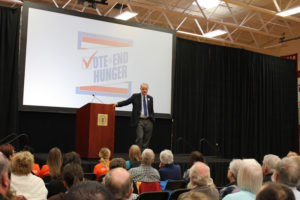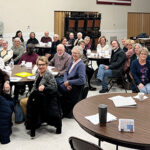By Barb Arland-Fye
The Catholic Messenger
DES MOINES — Iowans should make the most of their opportunity to influence presidential candidates on the cause of ending hunger and poverty in the United States and around the world. Religious leaders, politicians and social justice activists delivered that message Nov. 8 during the Vote to End Hunger Rally at Grand View University.

The Rev. David Beckmann, president of Bread for the World, talks during a Vote to End Hunger Rally in Des Moines on Nov. 8.
“We are in a strategic position to propose priorities that should guide our nation’s government these next four years,” said Bishop Richard Pates of the Des Moines Diocese, referring to Iowa’s first in the nation presidential caucuses Feb. 1. “In solidarity with the hungry of the world, let us not squander this opportunity. Let us Vote to End Hunger.”
Iowa Catholic Conference and Bread for the World, a national hunger-fighting organization, sponsored the rally as part of a broad coalition of organizations and individuals committed to ending hunger in the United States and around the world. Coalition members want to inspire the next president and Congress to take action to put the United States and the world on track to end hunger by 2030.
“It seems possible we could end hunger by 2030,” said Bread for the World’s president, the Rev. David Beckmann. As evidence, he cited figures that show a decline in the number of people living in extreme poverty from 1990 (2 billion) to today (1 billion).
Beckmann knows the face of hunger. One of his two adopted sons struggled with addiction, which led to that son’s experience of hunger and poverty. The son eventually got the treatment and care he needed through a drug court program and now is married, with children, and employed.
Jean Rolfe of Dubuque also knows the face of hunger; it’s hers. She and her four young sons became hungry and homeless after her marriage of 18 years crumbled because of domestic violence. She choked up as she recalled telling her sons “we have no place to live and we have no food. I don’t know what we’re going to do.” Her family received help through Dubuque food pantries, which was a godsend, she said. Jean has now earned her Associate of Arts degree.
The bishop urged the audience of around 200 people to talk with presidential candidates about dramatically increasing the line item for international assistance or even doubling it to 1 percent. In his talk, he also identified three interconnected perspectives that could serve as a platform for achieving food security worldwide and also spread peace:
• Double humanitarian aid in the federal budget to 1 percent to help developing nations to achieve self-reliance in food security.
• Establish diplomatic and political policies that address conflict around the world.
• Grapple with climate change in the interest of the universal common good, which in turn positively impacts the reduction of hunger.
Organizers had hoped presidential candidates would attend the rally, but they did not. Two Iowa legislators, however, did attend the rally and shared their thoughts: State Rep. Mark Smith, D-Marshalltown, and State Sen. Brad Zaun, R-Urbandale.
Smith recalled the food commodity program of the 1960s and 1970s that he became familiar with as a social worker. He suggested such a program might work today. He plans to address food insecurity issues in the state legislature. Sen. Zaun urged the audience to follow Bishop Pates’ advice to not squander the opportunity to ask presidential candidates what they’re going to do to stop hunger. ee and is job hunting.
The Bread for the World president noted that economic prosperity had a lot to do with reducing hunger and poverty, and that’s a key to eradicating it by 2030. He also stated a need for the U.S. to boost its allocation of funds for humanitarian foreign aid, as did Bishop Pates.
Currently the U.S. allocates in the neighborhood of .5 percent of its annual budget, or $500 billion, to international assistance. “In the aggregate, this is obviously a huge sum. Relative to the priorities of U.S. citizens, the allocation falls short,” Bishop Pates said. “In the scheme of the wise utilization of funds, it approaches the scandalous — vis-a-vis the investment for military purposes and the development, maintenance and stockpiling of nuclear weapons.”
How to reach out to candidates
Jos Linn, with RESULTS, a movement that seeks to influence political decisions that will bring an end to poverty, offers these suggestions for Iowans wanting to persuade candidates and policy makers to make hunger and poverty an issue:
Before:
• Find out what the candidates have said about the issue. Check their campaign websites, newspapers, and the candidate videos at VoteToEndHunger.org.
• Recruit others to go with you.
• Prepare what questions you will ask.
• Dress in bright colors so you are more likely to get noticed for a question, but avoid shirts with writing on them.
During:
• Arrive early and note where the microphones and stage are placed.
• Sit strategically. If you are in a group, spread out as candidates will usually take questions throughout the crowd, not just in one section. Place yourself close to the stage or near a microphone.
• Be “first, fast, high.” Get your hand up right away when the opportunity to ask questions arises and keep it high up to get noticed.
• If you have the chance to ask a question, hold onto the microphone until the candidate has finished answering.
• Talk to the candidate’s staff and provide and resources you have supporting our initiative.
• Talk with the media, making sure they know you believe hunger is an important issue.
After:
• Follow up with the candidate’s staff to see if any progress has been made. This holds the candidate accountable and lets you develop a relationship with staff.
A personal story can make a big impact and is more likely to be remembered than a set of facts. How has hunger touched you or someone you know?











